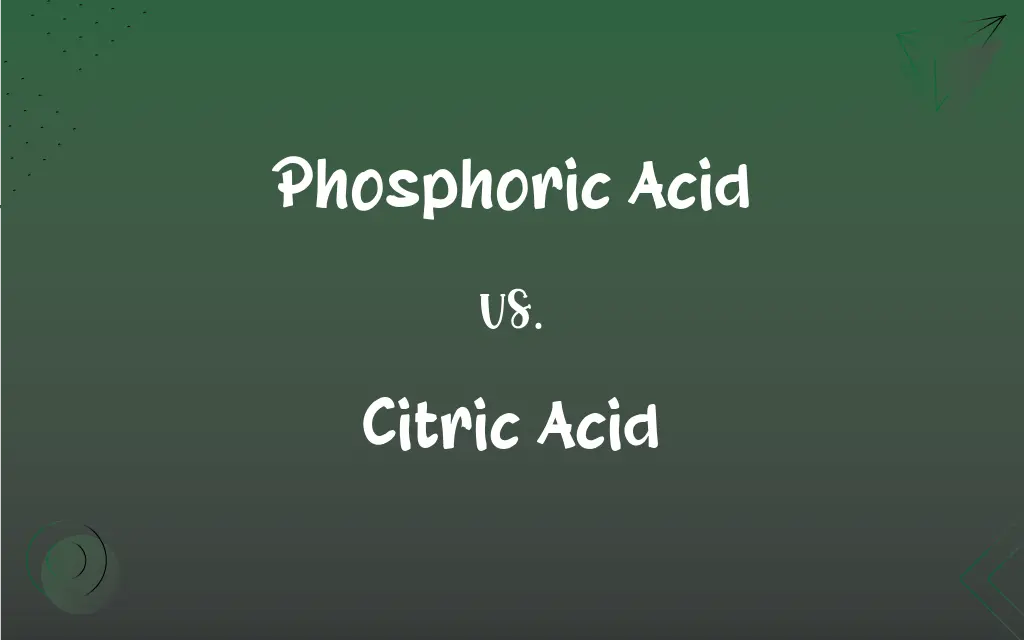Phosphoric Acid vs. Citric Acid: What's the Difference?
Edited by Aimie Carlson || By Janet White || Published on December 13, 2023
Phosphoric acid is a mineral (inorganic) acid used in detergents and fertilizers, while citric acid is an organic acid found in citrus fruits, used in food and beverages for flavor and preservation.

Key Differences
Phosphoric acid, a mineral acid, is composed of phosphorus, oxygen, and hydrogen. It's derived from phosphate rocks and used industrially. Citric acid, an organic compound, is found naturally in citrus fruits like lemons and oranges and is used mainly in the food and beverage industry for flavoring and as a preservative.
Phosphoric acid is extensively used in agriculture as a fertilizer component and in various industries for metal cleaning and rust removal. Citric acid, on the other hand, is widely used in food preparation for its tart flavor, in beverages as an acidulant, and in pharmaceuticals for effervescent formulations.
Phosphoric acid is a colorless, odorless solution in its pure form and is syrupy at higher concentrations. Citric acid is a white crystalline solid with a sour taste and is soluble in water, contributing to its widespread use in the culinary field.
Phosphoric acid can be corrosive and harmful if inhaled or upon skin contact. Citric acid is generally considered safe and is commonly used in food, but it can cause skin irritation in concentrated forms.
Phosphoric acid production can have significant environmental impacts, particularly concerning phosphate mining and waste. Citric acid, being biodegradable and derived from natural sources, has a lesser environmental impact.
ADVERTISEMENT
Comparison Chart
Chemical Composition
Inorganic, contains phosphorus
Organic, contains carbon
Natural Occurrence
Derived from phosphate rocks
Found in citrus fruits
Primary Uses
Fertilizers, detergents, rust removal
Food and beverage flavoring, preservation
Physical Form
Colorless, odorless, syrupy liquid
White, crystalline, sour taste
Health and Environmental Impact
Corrosive, hazardous in high concentrations
Generally safe, biodegradable
ADVERTISEMENT
Phosphoric Acid and Citric Acid Definitions
Phosphoric Acid
A compound with the formula H₃PO₄, used in detergents.
Phosphoric acid effectively removes hard water stains.
Citric Acid
A weak organic acid used as a natural preservative.
Citric acid is added to jam to extend its shelf life.
Phosphoric Acid
A reagent in biochemistry and molecular biology.
Phosphoric acid is used in DNA extraction protocols.
Citric Acid
A flavoring agent in food and beverages.
Citric acid enhances the fruity taste in candies.
Phosphoric Acid
A food additive used to acidify foods and beverages.
Soda often contains phosphoric acid for a sharper taste.
Citric Acid
Used in cleaning agents for its chelating properties.
Citric acid effectively removes lime scale from kettles.
Phosphoric Acid
A rust remover and metal cleaner in industries.
The mechanic used phosphoric acid to clean the corroded parts.
Citric Acid
A component found in citrus fruits like lemons.
The tartness of lemonade is due to citric acid.
Phosphoric Acid
A colorless, odorless inorganic acid used in fertilizers.
The factory produces phosphoric acid for agricultural products.
Citric Acid
A key intermediate in the citric acid cycle in metabolism.
Citric acid plays a vital role in cellular energy production.
FAQs
Are phosphoric acid and citric acid naturally occurring?
Phosphoric acid is derived from phosphate rocks, while citric acid is naturally present in citrus fruits.
Can phosphoric acid be used in pharmaceuticals?
It's used in some pharmaceutical preparations, particularly as a buffer.
What is phosphoric acid?
A mineral acid with the formula H₃PO₄, used in fertilizers and cleaning agents.
Is phosphoric acid harmful?
It can be corrosive and harmful in high concentrations, requiring careful handling.
What is the role of citric acid in metabolism?
It's a key intermediate in the citric acid cycle for energy production in cells.
Is phosphoric acid used in soft drinks?
Yes, it's added to some soft drinks for tartness and as a preservative.
Is citric acid biodegradable?
Yes, it's biodegradable and environmentally friendly.
What is citric acid?
An organic acid found in citrus fruits, used as a flavoring and preserving agent.
Is citric acid safe for consumption?
Yes, it's generally safe and widely used in the food industry.
What are the environmental impacts of phosphoric acid?
Its production can have significant impacts due to phosphate mining and waste.
Can both acids be used in food?
Yes, both are used in food, but citric acid is more common as a flavor enhancer and preservative.
What industries use phosphoric acid?
It's used in agriculture, cleaning, and metal treatment industries.
Can phosphoric acid remove rust?
Yes, it's effective in rust removal and metal cleaning.
Does citric acid have cleaning properties?
Yes, it's used in eco-friendly cleaning products due to its chelating properties.
How is citric acid produced industrially?
It's produced through fermentation using certain mold strains.
Are there any health concerns with citric acid?
In concentrated forms, it can cause skin irritation, but is generally safe in food.
Is citric acid used in beauty products?
Yes, it's used in skincare for its antioxidant properties and pH adjustment.
What's the difference in taste between the two acids?
Phosphoric acid is more sour and harsh, while citric acid has a milder, fruity sourness.
Can phosphoric acid affect bone health?
Excessive consumption, particularly in soft drinks, has been linked to lower bone density.
Can I substitute one acid for the other in recipes?
They can sometimes be substituted, but the flavor profile and strength differ.
About Author
Written by
Janet WhiteJanet White has been an esteemed writer and blogger for Difference Wiki. Holding a Master's degree in Science and Medical Journalism from the prestigious Boston University, she has consistently demonstrated her expertise and passion for her field. When she's not immersed in her work, Janet relishes her time exercising, delving into a good book, and cherishing moments with friends and family.
Edited by
Aimie CarlsonAimie Carlson, holding a master's degree in English literature, is a fervent English language enthusiast. She lends her writing talents to Difference Wiki, a prominent website that specializes in comparisons, offering readers insightful analyses that both captivate and inform.






































































